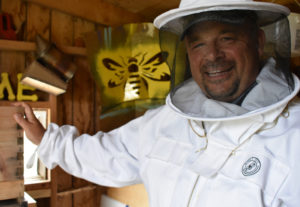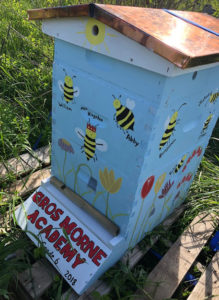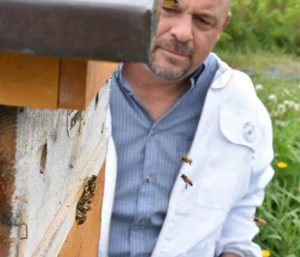“Bee”lieve in the Newfoundland honey bees
BY Melissa Wong
August 2018
Honey bees are threatened by habitat loss, pesticides, herbicides, parasites, and disease. Newfoundland, Western Australia and the Isle of Man are the only three places where they are safe from many of these dangerous threats.
Many Newfoundlanders are happy to have the bees.
According to Chelsea Foley, Outreach Coordinator for Newfoundland and Labrador Federation of Agriculture (NLFA) and Agriculture in the Classroom NL (AITC-NL), there are seven commercial honey producers here, with the potential of three more in the future. She said many Newfoundlanders keep collections of beehives or apiaries with their partners or families, and the number of bees per yard is estimated to be 70.
I went to Adelaide’s Honey Bee, Pollinator and Wildflower Reserve, in the Goulds, where I met Paul Dinn, the “bee whisperer” who uses low impact beekeeping methods that include only checking the hives every ten days, spreading their bee hives throughout the woods so they do not compete with the native pollinators, and if one hive is weaker than another, taking honey from a stronger hive and giving it to the weaker one.

Paul Dinn, Bee Whisperer, wearing his full honey bee protection suit. Melissa Wong/Special to Newfoundland Quarterly.
Adelaide’s Honey is “basically ten acres dedicated to the protection of wildflowers, pollinators, and honey bees.” Paul explained. “Our family [has] had the property for over a hundred years,” he added.
The land was owned by Paul’s great-grandparents before he and his wife Brenda eventually inherited it. They started out with three beehives, from the Newfoundland Bee Company, and Paul said they enjoyed beekeeping so much that by the end of the summer “we should have 60 to 100 beehives.”
Paul investigated the risk involved with the Newfoundland and Labrador Beekeeping Association (NLBA). He said the bees don’t bother people because they have no interest in them.
“We go down there with our shorts on,” Paul said. “We sit down and watch the bees. They are flying all around us and we don’t feel threatened or anything.”
To raise awareness of honey bees and their operation, the Dinns have created the honey bee hiking trail.
“We will start off with our orientation then we will take them down and kind of look at the different hives. Then, we will do our hike. The nice thing on the hike is they are hearing all the birds and seeing bees forging on all the different wildflowers.”
“When we come back to the hive we will do an inspection [of a beehive] and when we do an inspection that is when you need to put your suit on,” Paul said. “If you move too quickly the bees become defensive, but they are not aggressive. They are only protecting their babies and the eggs. We’ll apply a little bit of smoke to the hive, which calms the bees down, and then people get to see the inside of the beehive. Everyone can take a little spoonful of honey and taste it right from the beehive.”
The hike is not the only way Adelaide’s Honey is drawing awareness to the importance of bees in Newfoundland and Labrador.
“We did a school painting-the-bee-hive contest, [it was] an art contest,” Paul said. “This was [done because of our] partnership with the Federation of Agriculture.”
“AITC-NL organizes Canadian Agriculture Literacy Month every March and thought that would be a great time to launch the contest as we were also launching a new storybook about bees,” said Chelsea Foley. “Canadian Agriculture Literacy Month had 277 classes signed up this year, so we included contest details in the classroom kits. Each class was allowed to send three entries to the Bee Creative Contest. AITC-NL received 56 entries from 23 classes.” The winner was the grade six class at Gros Morne Academy.

Submitted by Paul Dinn.
“It’s a great way to promote agriculture and beekeeping and we are going to do it every year,” said Paul.
According to Paul and Chelsea, Newfoundland is one of the healthiest places for bees to live, because it has acres of bee-friendly wildflowers, shrubs, and trees. It does not have such pests as Varroa destructor and spores of American Foulbrood that are very destructive to beehives.
According to the NLBA’s website, “Our very survival depends upon bees and pollinators as every third bite of food we consume is because of their work. Newfoundland honey bees are special as they are one of the healthiest in the world and we want to keep it that way.”
“I think more people are going to get into beekeeping as time goes on and realize how special it is,” said Paul.
While you’re here:
… we hope you enjoy our website! Our online audience is growing every month, and that means that more people like you are seeing and reading incredible new work by Newfoundland and Labrador writers and artists. We want the people of the province to have access to high quality, contemporary writing about the unique and ever-evolving culture of this place, so we’re offering our online content for free. That said, if you’re able to help us keep providing this opportunity to both readers and creators in Newfoundland and Labrador, we encourage you to subscribe to our print magazine. Subscription details are here. If you ‘d like to support us with a donation or legacy gift (tax receipts available,) please contact us at rcohoe@mun.ca.



